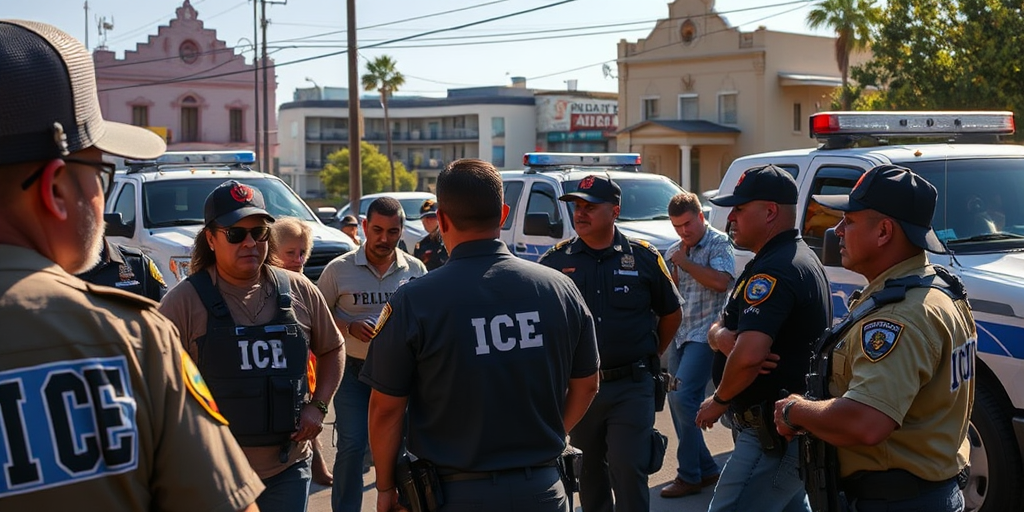**ICE Arrests at San Benito Worksite Highlight Tensions in Local Industries**
In a significant move underscoring the ongoing complexities surrounding immigration enforcement in the Rio Grande Valley, seven individuals were detained by Immigration and Customs Enforcement (ICE) in a worksite operation in San Benito, Texas. This event adds another layer to the intricate socio-economic landscape of the Valley, drawing attention to the delicate balance between regulatory enforcement and the economic realities of industries reliant on immigrant labor.
**ICE Operation Details and Background**
According to Homeland Security Investigations’ San Antonio office, the raid at a San Benito worksite resulted in the arrest of seven individuals, one of whom is facing criminal proceedings for re-entering the U.S. after previous deportation. The operation forms part of a broader strategy of ICE actions across South Texas, aimed at ensuring compliance with immigration laws.
The arrest in San Benito is not isolated. Historically, ICE has targeted sectors such as construction, hospitality, and food services, which employ a large number of immigrant workers. A newly released video from HSI highlights the scale and impact of these operations, offering a sobering glimpse into the enforcement mechanisms at work and the immediate effects on the local workforce.
**Economic and Community Implications for the Valley**
The Rio Grande Valley, a region with a vibrant tapestry of cultures and an economy intricately linked to cross-border movement, faces unique challenges in light of these enforcement actions. Industries crucial to the local economy, such as construction, have expressed concerns over the implications of losing labor due to such raids.
The South Texas Builders Alliance, representing the construction sector, held a town hall meeting recently to address fears among members regarding workforce attrition following ICE raids. The sector has repeatedly highlighted its reliance on immigrant workers for project completion and regional growth.
John Ramirez, a local construction business owner who participated in the town hall, voiced the industry’s perspective: “In the Valley, our success is deeply connected to our workforce, much like the communities we build around here. These raids have a lasting impact not just on businesses, but on families and neighborhoods as well.”
**Perspectives and Reactions**
The actions taken by ICE continue to ignite discussions on the need for balanced approaches that protect both national interests and regional economic stability. Local authorities remain caught between enforcing federal directives and addressing the socio-economic needs of their constituents.
Community advocates, meanwhile, argue for humane enforcement practices and broader immigration reforms. Elisa Garcia, a prominent advocate with a focus on immigrant rights in the Valley, emphasized, “It’s essential to find pathways that honor human dignity while addressing labor needs and security concerns. Community voices must be part of this dialogue.”
**Previous Incidents and Ongoing Issues**
This latest arrest marks a continuation of heightened enforcement in regions widely recognized for their immigrant populations. In past incidents, ICE operations have led to increased apprehensions across industries and rekindled debates about the role of immigrant labor in local economies.
The Valley has seen related incidents, such as bakeries and other local businesses bearing the brunt of decreased workforce availability post-raids. Previous efforts to mitigate impacts include community education forums and strategic partnerships between local business groups and advocacy organizations.
**Future Considerations and Community Resources**
Looking ahead, the Valley community may need to further engage with policymakers to articulate the necessity of immigrant contributions to the local economy. Such dialogue could be pivotal in crafting nuanced policies that respect both national security mandates and regional economic health.
For residents and businesses affected, resources are available through local organizations that offer legal support and advocacy services. The upcoming meetings organized by the Builders Alliance and similar entities aim to provide support and open channels of communication for affected workers and business owners.
As the situation evolves, the RGV’s resilience and community spirit will undoubtedly play a crucial role in navigating the challenges posed by these enforcement activities. Valley residents are encouraged to remain informed and participate actively in discussions impacting the region’s future.
In conclusion, while the ICE arrests at San Benito highlight ongoing tensions, they also reinforce the need for comprehensive approaches that honor the contributions of immigrants while ensuring legal compliance. As the RGV community continues to grapple with these realities, the focus remains on balanced solutions reflective of both economic needs and community values.







